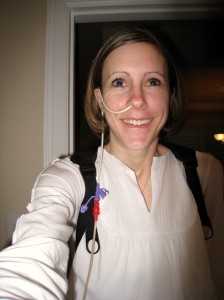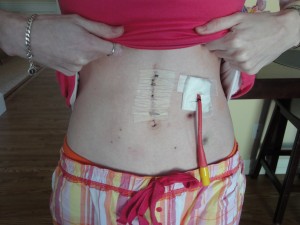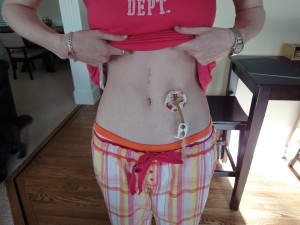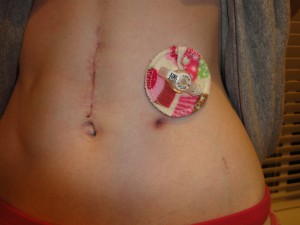Definition – Symptoms – Causes – Tests – Treatments – Advancements
Gastroparesis:
Just Imagine…
Can you imagine never being able to eat again? Hooking up to IV nutrition or tube feedings every day in order to live? Carrying your nutrition on your back all day or being attached to a pole all night? Or, simply having to “survive” on chicken broth, Ensure, and small bites of food all day long? And in spite of that, still dealing with malnutrition, dehydration, weight loss, abdominal pain, nausea, and vomiting on a daily basis?
Frequent trips to the ER and hospital become routine…just a part of life. Social activities are non-existent because most of them involve food. If you do go out, you end up ordering water, maybe a soda, and pulling that pack of crackers out of your purse to nibble at. You feel fortunate that you are even capable of keeping that down, realizing that many people in similar situations can’t. Making plans is a challenge. You may feel well and up for an outing, but then while out the symptoms attack and a planned fun-filled evening becomes a drag very quickly. That’s what life with gastroparesis and intestinal pseudo-obstruction is like.
These conditions are so poorly understood. They are so hidden that people often don’t believe they are real or are not as serious as they actually are. Although difficult to understand, patients suffering from GP and CIP may look completely healthy. They may drive, work, shop, go to church, take care of a family, and look great on the outside. Their color may be nice, they may look strong and energetic, and they may appear to be feeling well. Yet, the turmoil churning within them is by no means normal.
Remember the last time you had the flu. After 24 hours of nausea, vomiting, perhaps diarrhea, and aches and pains, you couldn’t wait to get back to work and your normal activities. As you tried to return to your routine activities, however, you did notice you felt weaker than usual. It was more challenging to get things done because you had a day of surviving on toast, crackers, and soup…not exactly a champions dinner!
Now, take that day and multiply it by years. Add medication, medical procedures, hospitalizations, chronic malnutrition complications, invasive treatments, surgeries, and additional illnesses that develop over time. You are getting closer to understanding what life with GP and CIP is like, but you are still not there.
On top of the physical issues, because the conditions are so poorly understood, people with GP and CIP often have to live with the challenges of stereotyping by society. It is often believed that patients are exaggerating their conditions because they don’t “look sick.” Others believe those who suffer really just have an eating disorder and use a “mild” condition as an excuse for not eating well. People simply don’t understand that a couple sips of soup can send one’s gut into a frenzy and result in hours of nausea, abdominal pain, and vomiting. Sometimes this lasts even for days. One wrong bite of food can result in a bowel obstruction and trip to the hospital for an NG tube for suction or surgery to remove the blockage. There are no cold and flu treatments to help symptoms or treat the conditions at all. At best, patients can try some anti-nausea medications with nasty side effects, or drugs that are so expensive insurance companies only provide 12 a month…so they have to decide which 12 times a month they are sick enough to take it. On top of that, any drugs that may help are pulled from the market and no longer available. Once that is removed, even if restarted through compassionate clearance programs, they never quite work as well again. But the odds of getting on that program are slim to none. They feel like everything has been taken away from them…not only health, a normal life, food, and even friends and family who jump ship, but the only treatment that keeps them even somewhat functioning.
Think back again to the day you had the flu. You probably did not want to lift your head off the bed or couch. You felt too weak to make it to the bathroom. Every time you sat up, you felt your head spin and the nausea increased even more. Finally, it was a battle of determination to force yourself up and walk to distance to the bathroom. While you were up, you tried to grab as many items as you needed so you didn’t have to get back up again for a long time. By the time you get back to bed, you were so weak and wiped out that all you wanted to do is sleep or watch TV. But you couldn’t get your mind off the nausea. It was so overwhelming that you curled up into a ball on your side and just waited for it to pass. You took flu medication in hopes of sleeping it off and had hope that tomorrow would be better.
People with GP and CIP don’t have that hope that tomorrow will be better right now. Each day varies and some are better than others, but inevitably the bad days will always come back. There are limited options to treat symptoms, but they don’t work well. Patients are basically told to “live with it.” In some cases, it can’t be lived with. While most people with GP get by on what is available, because there are no other options, quality of life is certainly very poor. Many survive on less than 1,000 calories a day, severe weight loss, disability, tube feedings, IV nutrition, medication with nasty side effects, and a life full of invasive medical treatments and hospitalizations. GP and CIP are not just simple illnesses which can be cured through diet changes, medication, or surgery. They do not mildly impact life. They have a profound influence on every daily activities, regardless of severity. There is no escape. Is this the kind of life a person wants to “just live with?”
There are also many situations in which living with GP and CIP are no longer an option. In severe cases, chronic malnutrition takes over and people are unable to survive the trauma on the body. The body often quits absorbing, organs shut down, and the liver may fail for those who have been on long term IV nutrition. Veins become inaccessible and there is no way for them to receive nutrition. Some who are fortunate enough to be aware of the option and be eligible may pursue a five organ transplant as a last resort to stay alive. While this can be miraculous and life saving, it doesn’t come without its own complications for life. Individuals who reach this level of severity have become desperate. There are no options. They either risk their lives by going through a transplant, recognizing that even if they make it to the transplant and out of the OR, they face a lifetime of complications and possible organ rejection. But the only other option is starvation. There’s not really a choice when you get to that point.
Living with GP and CIP is hard to describe. The best patients can do to help others understand is to tell people to consider what it would feel like to have the flu, every single day, and the impact that would have on your life. But then you have to throw in additional health problems and the stereotypes, comments, and claims by others that what they deal with is not real and not worthy of attention. Because they don’t “look” sick, family and friends who don’t believe put a wedge between them or completely leave, believing that the person is trying to use a mild condition to “benefit” from resources such as disability, have an excuse to get out of unwanted duties, a way to receive special parking “privileges,” and other accommodations at work and school. They are often looked at oddly when forced to admit they are on disability because of a “stomach” problem, can’t lift a box of sodas into their cars because they are too weak, get glared at because they park in an HP spot but get out of the car walking, and dealing with other colleagues and students who are jealous of the accommodations received to make life easier to live and adaptation into society easier.
GP and CIP need more attention. People don’t understand what it is really like to fight these conditions and what daily life is like for those who suffer. They are downplayed as simply being conditions that can be controlled if “you would just eat correctly and avoid certain foods.” While in some instances this is true, there is a very wide spectrum to the level that people die from these conditions as well. If not to the point of dying physically, many are unable to truly “live” at all as GP and CIP zaps the life out of them. Note how long it took you to recover from just a 24 hour flu. Then realize that in GP and CIP there is no recovery. There is no in between. It is a daily battle, with ups and downs, unknowns, and a life full of complexity and misunderstanding. Try to step into their shoes for a short time. Next time you have your head in the toilet, imagine life like that every day. Be thankful for what you have. Be thankful you will recover and life will return to normal. And remember those whose lives will never return to normal. Give back. Help them fight. Support them. Try to understand. Let them vent without judging them. Encourage them. They often lack self-confidence because they have either been judged so much or feel as if they are incapable of accomplishing important things because of being ill. Also, realize that you are dealing with some of the strongest, toughest, people you will ever meet. Thank you for taking the time to read this and step into the lives of those suffering from GP and CIP for a short time.
From Wikipedia:
Gastroparesis, also called delayed gastric emptying, is a medical condition consisting of a paresis (partial paralysis) of the stomach, resulting in food remaining in the stomach for a longer period of time than normal. Normally, the stomach contracts to move food down into the small intestine for digestion. The vagus nerve controls these contractions. Gastroparesis may occur when the vagus nerve is damaged and the muscles of the stomach and intestines do not work normally. Food then moves slowly or stops moving through the digestive tract.
- Nausea *
- Vomiting
- Early satiety *
- GERD *
- Weight Loss *
- Burping
- Abdominal Distention *
- Malnutrition/Vitamin/Mineral Difficiencies *
- Uncontrollable Blood Sugar Levels
* Personally experienced
Causes of gastroparesis vary between each individual patient just as the symptoms vary. However, it is hypothesized that damage to the main nerve controlling stomach function (vagus nerve) causes most cases of gastroparesis. Damage can be from the common virus, abdominal surgery and diabetes. Sometimes the cause of gastroparesis is never determined and this is called idiopathic gastroparesis.
Diagnosing gastroparesis is often a matter of elimination. This is because it doesn’t always show up in tests. There are ways to directly diagnose it, but they are by no means a way to prove someone isn’t suffering from gastroparesis. Common diagnostic tests include but are not limited to:
- Medical history of symptoms
- A nuclear medical test called a gastric emptying study, the golden standard for diagnosing gastroparesis.
- Upper GI endoscopy
- Antro-duodenal motility study
- X-rays and CT scans
* My personal experience with all types of treatments can be found here.
Because the cause of gastroparesis is often unidentified, treatment aims more at controlling symptoms, rather than curing the problem. Treatments come in all forms such as diet changes/restrictions, medications, enteral nutrition and even surgery in the most severe cases.
Diet changes are often made based on the fact that the stomach is slow or non-functioning. Anything taken by mouth that would further slow down digestion is to be avoided. Foods high in fiber or fat will slow down the stomach. Vegetables, red meat, fried or fatty foods are all on the list of foods to avoid when you suffer from gastroparesis. Same goes for anything fortified with fiber. I find that staying away from any artificial sweeteners is also beneficial.
When diagnosed with gastroparesis and a change in diet is your first step of treatment, it is important to consult with a dietician or nutritionist to make sure your body is receiving what it needs. They can also help develop meal plans in oder to eliminate the foods that may cause more intestinal distress due to gastroparesis. Everyone is different. What foods work for one individual, may not necessarily work for another. This process is often slow but necessary so you don’t continually make yourself sick by eating the wrong food for your body. For more information on GP diet guides, visit GPDA’s Gastroparesis Diet.
When diet modification isn’t enough to control the symptoms of gastroparesis, medication is often the next step in treatment. Medications aim at increasing motility of the digestive system, especially the stomach. These medications include:
- Erythromycin (Benzamycin)
- Metoclopramide (Reglan)
- Domperidone
* My medication experience and list of maintenance medications
If medications are not effective enough, the other options such as tube feeding and surgery for a gastric neurostimulator should be investigated. These are usually last resort options. Medications and diet modification is usually enough to control symptoms.
Tube feeding is generally directed straight into the upper part of the intestine called the jejunum. It bypasses the malfunctioning stomach and is able to deliver nutrition. There are many different types of tubes from nasojejunal tubes (usually temporary to determine if you are able to handle tube feeds and is often placed endoscopically, under sedation by your GI or radiology), surgical tubes, endoscopically placed tubes (PEJ), and low profile tubes. Low profile feeding tubes are generally placed only after the stoma site has fully healed from a PEJ. It is important that the tract between the stoma and intestine be fully formed before a button is placed. If that tract breaks down during the procedure, you might experience complications like me. Your doctor can discuss with you, the best tube for your situation. I have had all four types of tubes as seen below.
* My tubes experience
The final stage in treatment is surgery. The current type of surgery performed is implantation of a gastric neurostimulator. A gastric neurostimulator, or stomach pacemaker, helps control nausea and vomiting by electrically stimulating nerves in the stomach. For some patients, the relief is instant while others take up to a year to notice any difference. It is not approved for improving gastric emptying but many hope that with time, they will notice a difference in that as well.
The surgery for a neurostimulator is typically between 1 and 2 hours with a hospital stay of 2-3 days. Pain from the procedure is like any other open surgery. For me, pain was easily controlled through IV medication and at home with oral medication. I required only a week or so for recovery before I felt well enough to get out and do things. The device can be remotely accessed in your doctor’s office after the procedure. Adjustments are made individually and many adjustments are usually needed to fully take advantage of the device.
* My surgery experience
There are positive advancements being made in the treatment of gastroparesis.
Tranzyme
Also known as Ulimorelin, this drug Tranzyme Pharma (TZP) has shown extremely positive results in controlled testing of diabetic gastroparesis. It has shown to be a potent prokinetic drug, significantly reducing nausea and vomiting while promoting gastric emptying. The furthest testing phase is seen with the IV delivered drug (TZP-101) but the oral (TZP-102) trials are not far behind. If this drug does what studies show it to be doing, it would be a very exciting bit of information for so many of us plagued by the disease of gastroparesis (idiopathic or otherwise) and the symptoms it produces.
To follow the progression of the developing treatments of TZP, visit:
- Tranzyme Pharma’s Clinical Results on Ulimorelin
- Tranzyme Pharma Press Release (June 29, 2010)
- Positive reports from TZP102 and diabetic gastroparesis
* For more information centering around gastroparesis, feel free to visit my Recipes page, Spoon Theory page and Open Letter *











55 Responses
Kirby says...
If you need someone to talk with, I’d love to help. Not sure why the e-mail isn’t working. You can try it again if you’d like. Kirby@livingwithgp.com Sorry that it has taken so long to get back to you. This has not been a good year for me. I’ve tried to do what I could, in terms of updates, but my responses have been slow. I apologize and hope that you are still in good health. Thank you so much for your expressed experiences and victories.
Ali says...
Hey my name is Ali and I’m 23 I was diagnosed with gp almost 6years ago . Finally they told me gp after I had was 110 lbs and unable to keep anything down . Tried all the regular pills and diets and refuse to get the j tube . I was pretty depressed and unhappy generally I couldn’t function at all and the gut pain and nasty naseau controlled me . I have improved my quality of life over the past 3 years after being sick and tired of living with gp . It took me a long time to put together all the pieces to learn to keep for down . Here’s what I do to live life as comfortable as I can (don’t get me wrong I still and very sick every day but I can consume nearly 4000-5000 calories a day ) 1st step was to cut all pills . Within weeks I had lost so many side effects I was on the right track . Next my doctor set me up with medical marijuana (my parents were very against it until they saw me eat solid food at diner !they cried and life has never been the same since ) 2nd step was to increase excerzize since the marijuana allowed me to remove the naseau symptoms and pain , don’t get me wrong it’s not a cure but it’s a very good bandaid that allows temporary relief and healing . I could finally sleep and eat small amounts throughout the day . Still very sick but I would just lay down and wait for it to pass when a wave hit . So for excersize I began swimming with any extra energy I could get together slowly over 2 years getting stronger . My gp was caused by brain damage and post concussion syndrome so while living with gp I also had symptoms like being sensitive to light and sound , unexpected mood swings and the biggest challenge was speaking without a studded or slight dyslexia with putting together sentces . So the 2 years of excersize got me stronger to the point I could swim for a few hours and eat two small meals a day . Gained 5 lbs and forced my self to keep moving forward , every few day I would fall back into a rut but eventually make it out and keep going . My next step in happiness and Heath was to find a healthy activity that would also be a hobby to start living life for something other than just being sick . I love to swim and live near the ocean so surfing for me was just the next step , the ocean not surfing was my final step to being comfortable still sick but able to cope I used the power of the ocean to find happiness and a space where I can leave the sickness at the beach when I enter the water I am free . I wake up everyday sick at 5am suit up and get in the frigid ocean . I hope that who ever is reading this can take something from it t improve your life . Gp is very hard to deal with I know many people don’t support pot struggle to understand I urge u to try it out and be open minded , I want to reach out to the gp community and share how I can feel a little better if your against medical marijuana . Then give the ocean a shot for some happiness you just can’t find while sick on land . Or lastly at least start small work outs to I know you feel completely empty of energy if you ever want to move forward . You may never be “normal”again but you can atleast make your own normal not that bad . Love u guys and I send my positive thoughts to you all everyday . If anyone wants to contact me with any questions here is my email osahousetofino@gmail.com
Kim says...
Wow! Came upon your site looking for info on j/g tubes (just got a new one and i really dont like it!!)
Im a 50 (oh dear) year old womwn and havehad gastroparesis and pancreatitis pretty much my whole life but wasn’t diagnosed until about 13 years ago. Have been through iv feeds, j tubes and j/g tubes for about 10+years.
I understand your life and daily job of keeping fed. The biggest change in my life is when people stopped inviting me out saying, “well, you dont eat or drink….” Arghh! And then there people who look at me and say, “you dont look sick!” –i love to show these folks my multiscarred stomach!!
I have a wonderful life saving team at johns hopkins hospital, headed by dr. Kalloo (known as a gastro god) its a great place and great group of specialists.
As a part of the tube feed community inwanted to thank younfor taking the time to put together this site and keep it going…i cant imagine how much time you put into it!
Carry on the the good work and best of luck living the lige you want.
Morgan Buckner says...
Is it normal to get gp from an inflamed gallbladder? Or gastritis? This all started happening in March. After I ate a breakfast pizza. Not sure if it was food poisoning. I’m always nauseas and it takes 9 hours after eating to get hungry again. I’m on domperidone 10mg 3x daily. I haven’t noticed much. Do I need really small meals like snacks throughout the day? Is ice cream okay? I ate like two cups of ice cream and it took 8 hours to digest. Did I eat a little too much? Should a higher dose do the trick? How long should I be like this? I need to be normal by this summer. I’m going on two trips. I can’t handle this nausea if I’m on a boat or in a car and surrounded by people who don’t understand and make me eat until I’m sick. Should I get a pacemaker? I’m almost 10 pounds underweight. I look too skinny. I’m only 104 and 5’7. I’m slowly losing hope.
aidan c says...
I was reading most of these post and I was recently diagnosed with GP.I have never been so frustrated in all my life with these same symptoms.I have been unable to eat solid food now for 3wks and have lost 10lbs.Tired of soups and feeling weak and tired and no energy, all I can do is lay down. Have no desire to eat at all,Hopefully this doctor at Sinai can help me.
Temple says...
I was recently told I have GP. I have had these same symptoms for 5 years. Had my gallbladder removed, had HPylori twice and now find out this. I am scared and frustrated. I am on Zofran and pain meds. I think the hardest thing for me is getting people to just understand. everyone says try this and try that without listening to me. My husband wants to try and fix me and I don’t think he is ready to except that this is not just going to go away. The Zofran really does not work and the pain meds make it hard to function. I have three children who depend on me. I follow up with my GI AT the end of the month and I am going t o ask about the pace maker. I just want some relief and energy. Thank you for this site and allowing me to vent.
Ella says...
I have been suffering with GP for about 5months now. ER visits in and out, week long hospital stays. I’m a junior in school and spending my spring break and summer vacation in a hospital bed is not enjoyable. My stomach will not keep anything down at all, I am on NJ tube feeding constantly. They tell me that I will have to live with it till my body fixes myself, but I don’t even think doctors understand that GP is not something easy to live with, it’s not the common cold. It’s worse. I have good days where I can play with my little brother and then days where I can’t move in my bed. The pain becomes unbearable. Surgery scares me for I am only 14, but I will now try anything to be better. Is anyone in or was in school when surviving with GP? I would love advice as I go into my Junior year and the rest of my life.
Purt says...
It took my doctors about a year to diagnosis me with this condition. I am greatful that it finally happend for me to move on with my life and live it productively
Nee says...
I had similiar symptoms that after recurrent episodes of unable to eat or drink without throwing up at least twice the amount I tried took in I was so week and tired waiting to die and didn’t really care. Luckily I had my mom who drag me to the hospital. At the hospital I waited for 8 hours or more for xrays, ultrasounds, blood tests, all test came back negative. But I know when things started changing and one nurse practioner actually listened and suspected me for h.pylori from when I swallowed river water 4 years ago combined with tainted supermarket cantelopes and peanut butter. Anyhow I trust me when I say I know how you feel because to the average person not in my shoes I looked healthy when well enough to go out. Get tested for H.pylori if you can take down water without throwing up for two weeks or more. Forwarning, you must not eat anything with acid like soda pop, no lemon squeezes in soups, not even skittles candies when taking the anti-biotic combo +plus acid block medication that your doctor will prescribe if you are positive for H.pylori. Tips: so what can you eat? not much, I’ll tell you that. No spices. no peppers, no salts, no sugar. I am asian so we naturally have asian white rice at home and a rice cooker. I use the soft, precooked rice from the rice cooker to make porridge. Porridge is when you boil a big scoop of rice in plain water for about 30 minutes until its contents are thicken. To speed up the process you can smash the rice while boiling. You must stir frequntly or else it will burn at the bottom. With cooked rice: 4cups water for 1 cup cooked rice.
WillfulOne says...
After countless doctor/hospital visits, dry heaves, weeks spent in bed unable to eat, etc…..I found the best medicine for me. I’m very interested to hear if any of you have tried or even considered this. I highly recommend it, and will check back here in case any of you would like some quite educated information on the subject, or have any questions about it. Thanks for all of your experiences, and as a community (I’ll or not), we can rise above these issues and find cures, push through the pains, and continue to live this lovely thing we call life. 🙂
https://www.icmag.com/ic/showthread.php?t=311620